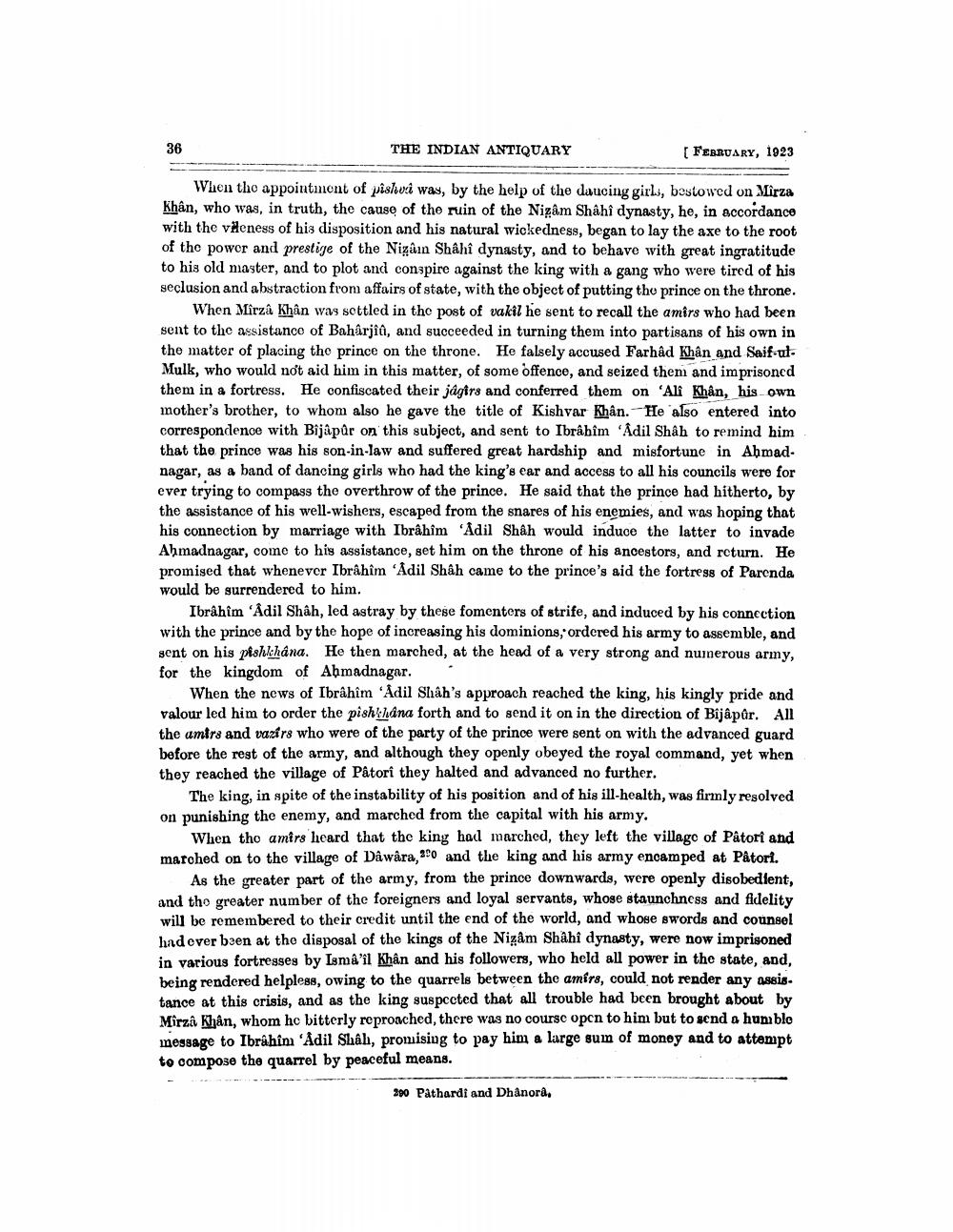________________
36
THE INDIAN ANTIQUARY
[ FEBRUARY, 1923
When the appointment of pished was, by the help of the daucing girls, bestowed on Mirza Khân, who was, in truth, the cause of the ruin of the Nigâm Shâhî dynasty, he, in accordance with the vileness of his disposition and his natural wickedness, began to lay the axe to the root of the power and prestige of the Nizân Shâhî dynasty, and to behave with great ingratitude to his old master, and to plot and conspire against the king with a gang who were tired of his seclusion and abstraction from affairs of state, with the object of putting the prince on the throne.
When Mirza Khan was settled in the post of vakil he sent to recall the amirs who had been sent to the assistance of Bahârjîû, and succeeded in turning them into partisans of his own in the matter of placing the prince on the throne. He falsely accused Farhad Khân and Saif-ulMulk, who would not aid him in this matter, of some offence, and seized them and imprisoned them in a fortress. He confiscated their jâgirs and conferred them on 'Ali Khân, his own mother's brother, to whom also he gave the title of Kishvar Khân. He also entered into correspondence with Bijâpûr on this subject, and sent to Ibrâhîm 'Adil Shâh to remind him that the prince was his son-in-law and suffered great hardship and misfortune in Ahmadnagar, as a band of dancing girls who had the king's ear and access to all his councils were for ever trying to compass the overthrow of the prince. He said that the prince had hitherto, by the assistance of his well-wishers, escaped from the snares of his enemies, and was hoping that his connection by marriage with Ibrâhîm 'Adil Shâh would induce the latter to invade Ahmadnagar, come to his assistance, set him on the throne of his ancestors, and return. He promised that whenever Ibrâhîm 'Adil Shâh came to the prince's aid the fortress of Parenda would be surrendered to him.
Ibrâhîm 'Adil Shah, led astray by these fomenters of strife, and induced by his connection with the prince and by the hope of increasing his dominions, ordered his army to assemble, and sent on his peshkhana. He then marched, at the head of a very strong and numerous army, for the kingdom of Ahmadnagar.
When the news of Ibrâhîm 'Adil Shah's approach reached the king, his kingly pride and valour led him to order the pishthana forth and to send it on in the direction of Bîjâpûr. All the amtrs and vazirs who were of the party of the prince were sent on with the advanced guard before the rest of the army, and although they openly obeyed the royal command, yet when they reached the village of Pâtorî they halted and advanced no further.
The king, in spite of the instability of his position and of his ill-health, was firmly resolved on punishing the enemy, and marched from the capital with his army.
When the amirs heard that the king had marched, they left the village of Pâtori and marched on to the village of Dâwâra, 20 and the king and his army encamped at Pâtori.
As the greater part of the army, from the prince downwards, were openly disobedient, and the greater number of the foreigners and loyal servants, whose staunchness and fidelity will be remembered to their credit until the end of the world, and whose swords and counsel had ever been at the disposal of the kings of the Nizam Shahî dynasty, were now imprisoned in various fortresses by Ismâ'îl Khân and his followers, who held all power in the state, and, being rendered helpless, owing to the quarrels between the amirs, could not render any assis tance at this crisis, and as the king suspected that all trouble had been brought about by Mirza Khân, whom he bitterly reproached, there was no course open to him but to send a humble message to Ibrâhîn 'Adil Shâh, promising to pay him a large sum of money and to attempt to compose the quarrel by peaceful means.
290 Pathardi and Dhanora.




